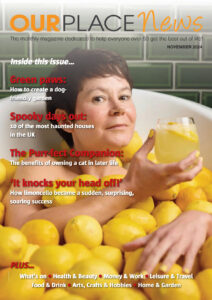From hatches to huts, sheds to retooled vehicles, let’s hear it for our terrace tuckshops and their indomitable staff.

A Thursday morning in July and tourists gather outside the birthplace of the Patron Saint of Football Snack Bars. There are seven such visitors in all – a family of four, a pair of bronzed pensioners and a lone lady in a floral bucket hat. She ponders a segment of paper, the family point at phone screens and bicker like starved hens, and the couple battle to open an umbrella as if calculating how to assemble an AK-47 rifle for the first time. It is gently thrilling to find these disciples of our game’s culture here, outside 29 Main Street, Roslin, in Midlothian. They too must have come to see where John Lawson Johnston, genius inventor of Bovril, was born.
Except, they don’t look very interested in the plaque that boasts his name. Then all seven drift away distractedly, and I realise they are looking for the chapel: Tom Hanks, The Da Vinci Code, Knights Templar and all that. Theirs is the wrong kind of holy grail.
Number 29 is a quietly handsome sandstone cottage with dormer windows protruding from its roof like frog eyes. That plaque – above and to the right of the front door, this house’s beauty spot – proclaims Johnston’s birth here, in 1839, and offers the simple epithet: “Founder of Bovril Beef Tea.”
The young Johnston apprenticed in his uncle’s butcher’s shop on Canongate in Edinburgh, while also studying chemistry and focusing on the science of food preservation. Continuing the family business into adulthood, in 1874 Johnston won a contract to supply rations of canned beef to the French army.
While visiting Canada to source supplies, he founded a tomato-canning firm that quickly began manufacturing an invention he had conceived: Johnston’s Fluid Beef. The entrepreneur sold it as a hot drink at Montreal ice carnivals and born was a tradition of outdoor imbibing that would one day stray to Montrose and beyond.
By the early 1880s, Johnston’s invention was being made and slickly marketed in London. It was rebranded Bovril, a name, he said, that “came to me over a cigar”. Its two halves sprang from dual origins: bos, the Latin for ox, and Vrilya, a vigorous, lifeforce character in a Bulwer Lytton novel, The Coming Race. Advertised as an alternative to booze, it thrived during the late Victorian and early Edwardian era of Temperance, gratifying the teetotal Johnston. Bovril was also pushed as a patriotic choice, a cure for medical ills and a sporting fillip – liquid snuff for the moustachioed Victorian all-rounder.
In 1900, Johnston died while aboard his yacht, in Cannes, a millionaire. Later, his invention would become a culinary and then cultural staple of football. Now, though, it seems as if references to Bovril far outweigh matchday sales. This is a symbolic totem of our game: something we say rather than do. And yet, a tuckshop of the terrace whose menu does not offer Bovril is seldom encountered. That would be like an art gallery without paintings.
Always the tabards and always the Styrofoam cups. Beyond Bovril, these are the vitals, the prerequisites, the circumstances. These are the components of the very best snack bars. A working-class tunic otherwise confined to the church hall or the ancient parochial hair salon; and a springy chalice in snow white made with materials from yesterday’s future. Encountering this duo is a homecoming no matter where you are.
There are kindred elements that can also spark this glow. A pie cabinet in the chrome grey of scratchcard foil, its contents queued like an army about to charge; colossal squeezy sauce bottles with congealing ketchup lava at the rim; fluorescent stars slapped on walls offering “Mars 70p” or “Monster Munch 50p” in marker pen letters; tea urns that look like space rockets in a child’s imagination; a beige Formica tray smothered by orderly rows of Kwenchy Kups or Topics or other lesser-spotted trimmings of delight. They are the kind of places where “Multipack: not to be sold separately” is not a warning but a badge of honour.
The catering hatch at Lochee United’s ground Thomson Park in north Dundee meets most of these heavenly criteria. “Shall we put up the shutter?” ask the kindly committee men standing at the gates as we arrive and explain ourselves an hour-and-a-half before kick-off. In their impeccable shirts and ties and with their thermal grins, they immediately summon affectionate thoughts of long-departed grandads. It is agreed with nods towards the hatch that “they” will be prepped by now and so one of the men taps the shutter’s metal folds: “Moira, could you roll up for these two gentlemen, please?”
The shutter hurtles open, a guillotine reversed. Behind the counter, Moira and Jeanette are wearing tabards. Pies huddle and stay warm in the silver cabinet. Bovril is £1.20. Moira has worked here for 32 years, Jeanette just over a decade. They never see any of the game; once the public is served, it is time to make the players their off-menu post-match meal of chips in curry sauce. There is never any trouble at the hatch, apart from rightful grief meted out to children who drop their manners. Reprimands are given, magic words requested and Haribo or Irn Bru duly delivered.
Moira and Jeanette are witnesses to routine, that linchpin of supporters. They see their Lochee versions of the typecast fans sprinkled across every ground in the land. There are early arrivals trotting up, same time, same pie. Then come those cantering in just prior to kick-off, when anything will do to sponge up the lager.
Half-time begins with the gallopers, racing away before the whistle to beat the queue and in dread of the words: “We’ve run out of those.” When that scenario unfolds and their usual refreshment cannot be ingested, any defeat in an hour’s time is blamed on this catastrophe. The Scotch Pie or the Twix are a superstition.
To the hatches and the sheds, to the huts and the repurposed vehicles we go. For fans, visiting is another ritual, another staging post of matchday. For clubs, here is another room in the house, its Moiras and Jeanettes another part of the family.
(Article source: The Guardian)

